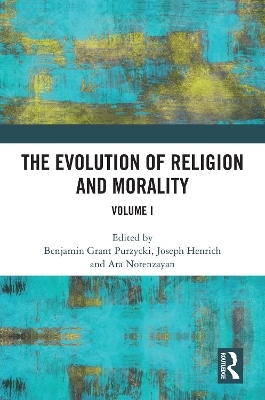
The Evolution of Religion and Morality
Routledge (Verlag)
978-1-032-62403-7 (ISBN)
This volume assesses the role of religion in cooperation and prosocial behaviour using ethnographic and experimental methods across eight different field sites. The first of two volumes presents results from the first phase of the Evolution of Religion and Morality (ERM) Project.
Using a unique combination of both experimental and ethnographic methods, the ERM project addresses pressing questions from the burgeoning cultural evolutionary sciences of religion:
What is the relationship between religious beliefs and cooperation?
When people are committed to punitive, knowledgeable, and morally concerned gods, are they more inclined to behave prosocially towards others?
How far does this prosociality extend?
Do important individual and contextual factors mediate this relationship?
In addition to an omnibus report, this book offers seven site-specific reports that contextualize experimental and ethnographic data collected around the world. Collecting data from communities as diverse as the Hadza of Tanzania, villagers from two communities on Tanna Island, Vanuatu, residents of Marajó, Brazil, Fijians from Yasawa and Lovu, Tyvans from southern Siberia, and Mauritians, this ground-breaking work sets a new standard in the scientific study of religion.
The Evolution of Religion and Morality: Volume I will be a key resource for scholars and researchers of religious studies, human evolutionary biology, psychology, anthropology, the cultural evolution of religion and the sociology of religion. This book was originally published as a special issue of Religion, Brain & Behavior.
Benjamin Grant Purzycki is Associate Professor at Aarhus University’s Department of the Study of Religion, Denmark. His books include Religion Evolving: Cultural, Cognitive, and Ecological Dynamics (with Richard Sosis, 2022) and The Minds of Gods: New Horizons in the Naturalistic Study of Religion (with Theiss Bendixen, 2023). Joseph Henrich currently Ruth Moore Professor of Biological Anthropology in the Department of Human Evolutionary Biology at Harvard University, Cambridge, USA. His research deploys evolutionary theory to understand how human psychology gives rise to cultural evolution and how this has shaped our species’ genetic evolution. His most recent book is The WEIRDest People in the World: How the West became psychologically peculiar and particularly prosperous. Ara Norenzayan is professor of psychology at the University of British Columbia, Vancouver, Canada, and Fellow of the Royal Society of Canada. He has published widely on the evolutionary origins of religion, and the psychology of religious diversity in today’s globalized world. He is the author of Big Gods: How Religion Transformed Cooperation and Conflict.
1. 1. The evolution of religion and morality: a synthesis of ethnographic and experimental evidence from eight societies2. High levels of rule-bending in a minimally religious and largely egalitarian forager population 3. Religion and expanding the cooperative sphere in Kastom and Christian villages on Tanna, Vanuatu 4. Religiosity and resource allocation in Marajó, Brazil 5. Jesus vs. the ancestors: how specific religious beliefs shape prosociality on Yasawa Island, Fiji 6. Buddhism, identity, and class: fairness and favoritism in the Tyva Republic 7. Religion and prosocial behavior among the Indo-Fijians 8. Big Gods in small places: the Random Allocation Game in Mauritius
| Erscheinungsdatum | 12.12.2023 |
|---|---|
| Verlagsort | London |
| Sprache | englisch |
| Maße | 174 x 246 mm |
| Gewicht | 480 g |
| Themenwelt | Geisteswissenschaften ► Philosophie ► Ethik |
| Geisteswissenschaften ► Psychologie ► Allgemeine Psychologie | |
| Geisteswissenschaften ► Psychologie ► Entwicklungspsychologie | |
| Geisteswissenschaften ► Religion / Theologie | |
| Weitere Fachgebiete ► Land- / Forstwirtschaft / Fischerei | |
| ISBN-10 | 1-032-62403-5 / 1032624035 |
| ISBN-13 | 978-1-032-62403-7 / 9781032624037 |
| Zustand | Neuware |
| Haben Sie eine Frage zum Produkt? |
aus dem Bereich


